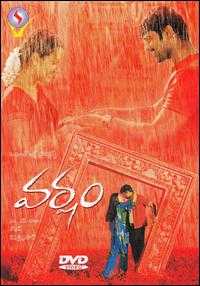Varsham
| Varsham | |
|---|---|
 | |
| Directed by | Sobhan |
| Produced by | M.S. Raju |
| Written by |
Paruchuri Brothers Veeru Potla M.S. Raju |
| Starring |
Prabhas, Trisha, Gopichand, Prakash Raj |
| Music by | Devi Sri Prasad |
| Cinematography | S. Gopal Reddy |
| Distributed by | Sumanth Arts |
| Release dates | 14 January 2004 |
| Running time | 166 minutes |
| Country | India |
| Language | Telugu |
| Budget |
|
Varsham (English translation: Rain) is a Tollywood film produced by M.S. Raju and directed by Sobhan. The film stars Prabhas, Trisha, and Gopichand. The music was composed by Devi Sri Prasad. This film was the first success of Prabhas after previous unsuccessful fiilms. The film was remade in Tamil as Mazhai starring Jayam Ravi and Shriya Saran and in Oriya as Barsa My Darling. It was dubbed in Hindi as Baarish.
Plot
The film was loosely based on the Ramayana. Venkat (Prabhas) and Sailaja (Trisha) are youngsters who first meet on a train during a rain shower. Venkat keeps bumping into Sailaja coincidentally every time it rains. This makes them both feel that it is perhaps the rain that keeps bringing them together, and they start to fall in love. Venkat is mesmerized by Sailaja's beauty, charisma, and childlike behavior. Sailaja, also, is impressed by Venkat. Due to unfortunate circumstances the two are drawn apart. At the same time that the two meet, Sailaja catches the eye of antagonist Bhadranna (Gopichand) who also becomes infatuated with Sailaja. Venkat and Sailaja meet in Warangal again and believe that they are meant for each other because it rains every time they meet. Ranga Rao (Prakash Raj), Sailaja's dad, is a typical black sheep with all kinds of bad habits. In the process, he is ready to marry off his daughter to Bhadranna for money. Ranga Rao plants certain ego problems in the minds of Venkat and Sailaja in order to break them up. This causes Venkat to leave Warangal for Vizag. And Sailaja prepares to become an actress (her father convinces her). Later on, Bhadranna kidnaps Sailaja. The rest of the story is about how Venkat rescues Sailaja from the bastion of Bhadranna and how he clears up the misunderstanding with Sailaja in the process.
Allegory
Throughout the movie, there is strong allusion to the Hindu epic Ramayana. Indeed, the story parallels the Ramayana in many ways, Venkat being an analogous Rama, Sailaja his Sita and Bhadranna being Ravana analogue. Towards the beginning of the movie, as Ranga Rao enter's Bhadranna's residence for the first time, he proclaims - "లంక లాగ ఉన్నదే" - "this looks just like Lanka". Later, during a live play of the Ramayana at his house, upon seeing Rama take Sita back from Ravana, Bhadranna stops the actors from continuing the play and demands the script be changed immediately by having Ravana tie the mangalasutra around Sita's neck. Similarly, at the end of the movie, during another live play of the Ramayana, Rama shoots a large Ravana effigy with a burning arrow, and it is this burning collapsing Ravana that ultimately kills Bhadranna, leaving us with the final allegory of Rama killing Ravana and rescuing Sita.
Shooting Spots
Venkat(Prabhas) and Sailaja(Trisha) confirm their love at a Temple while it's raining. This vital scene was shot at the Nandi statue of Thousand Pillar Temple in Warangal city. ‘Mellaga’ song was shot at the same temple.
Awards
- Best Female Playback Singer - K.S. Chitra - Nuvvostanante
- Best Choreographer - Prabhu Deva
- Best Audiographer - Madhusudan Reddy
- Best Film - M.S. Raju
- Best Actress - Trisha
- Best Music Director - Devi Sri Prasad
- Best Female Playback Singer - K.S. Chitra
- Best Cinematographer - S. Gopal Reddy
- Best Film - M.S. Raju
- Best Actress - Trisha
- Best Young Performer - Prabhas
- Best Music Director - Devi Sri Prasad
- Best Cinematographer - S. Gopal Reddy
- Best Choreography - Prabhu Deva
- Best Screenplay - M.S. Raju
- Best Dialogue - Paruchuri Brothers
Soundtrack
The soundtrack was composed by Devi Sri Prasad. The lyrics to all the songs were written by Sirivennela Sitaramasastri.
| Tracklist | ||||||||||
|---|---|---|---|---|---|---|---|---|---|---|
| No. | Title | Singer(s) | Length | |||||||
| 1. | "Nuvvosthanante" | Chitra, Raqeeb Alam | 5:32 | |||||||
| 2. | "Mellagaa" | S. P. B. Charan, Sumangali | 5:19 | |||||||
| 3. | "Nizam Pori" | Adnan Sami, Sunitha Rao | 4:12 | |||||||
| 4. | "Langa Voni" | Tippu, Usha | 3:52 | |||||||
| 5. | "Neeti Mullai" | Sagar | 1:20 | |||||||
| 6. | "Kopama" | Karthik, Shreya Ghoshal | 4:50 | |||||||
| 7. | "Joole Joole" | Mallikarjun, Kalpana | 5:02 | |||||||
Box-office performance
References
External links
- Varsham at the Internet Movie Database
| Awards | ||
|---|---|---|
| Preceded by Okkadu |
Filmfare Best Film Award (Telugu) 2004 |
Succeeded by Nuvvostanante Nenoddantana |
| ||||||||||||||